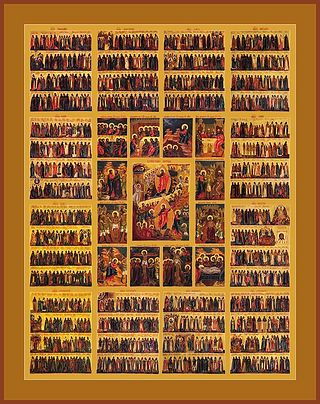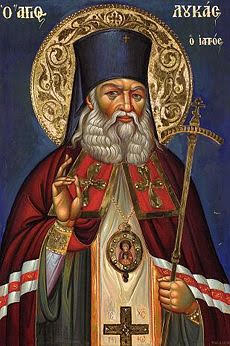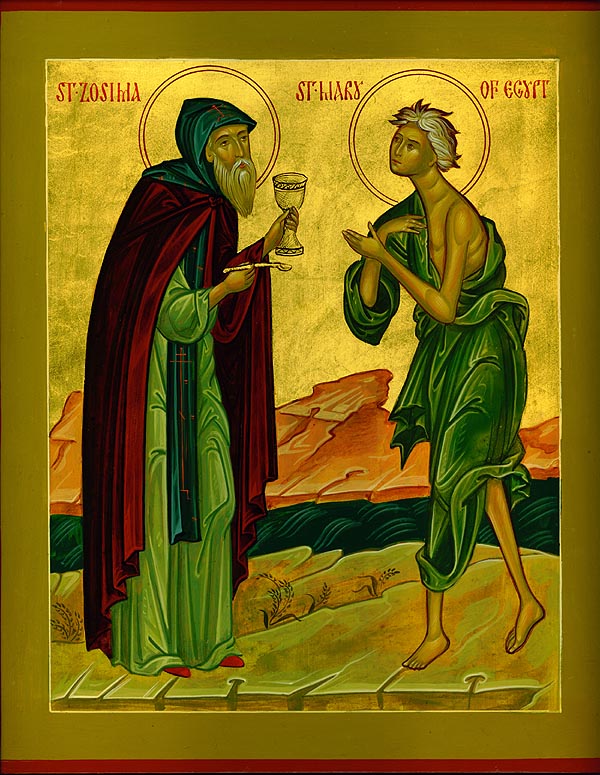Orthodox theology
Synaxarion for the Sunday of All Saints
 On this day, the Sunday after Pentecost, we celebrate the feast of all the Saints from throughout the inhabited world, in Asia, Libya and Europe, in North and South.
On this day, the Sunday after Pentecost, we celebrate the feast of all the Saints from throughout the inhabited world, in Asia, Libya and Europe, in North and South.
I sing the praise of each friend of my Lord,
If any would, let them now list them all.
Our most godlike Fathers decreed that we should celebrate the present feast after the descent of the All-holy Spirit, as showing in a certain way that the coming of the All-holy Spirit acted through the Apostles like this: sanctifying and making wise human beings taken from our mortal clay and, for the completion of that fallen angelic order, restoring them and through Christ sending them to God, some by the witness of martyrdom and blood, others by their virtuous conduct and way of life; and things beyond nature are achieved. For the Spirit descends in the form of fire, whose natural momentum is upwards; while dust, whose natural momentum is downwards, ascends on high, that dust which forms our mortal clay, the flesh added to and made divine by God the Word, which a short time before, had been exalted and taken its seat at the right hand of the Father’s glory. But he now also draws all those who wish, according to the promise, just as God the Word had manifested the works of reconciliation and what was the end, most suitable to its purpose, of his coming to us through flesh and of his dispensation, namely that he brings those who were rejected before to union and friendship with God—human nature offering to God the ungrateful people from the nations like first fruits—those who were outstandingly well-pleasing to him. This is one reason that we celebrate the feast of All Saints.
Luke (Voino-Yasenetsky) of Simferopol and Crimea
 Saint Luke, Bishop of Simferopol and Crimea, the Blessed Surgeon, was born Valentin Felixovich Voino-Yasenetsky (Валентин Феликсович Войно-Ясенецкий, polish spelling Wojno-Jasieniecki; Ap
Saint Luke, Bishop of Simferopol and Crimea, the Blessed Surgeon, was born Valentin Felixovich Voino-Yasenetsky (Валентин Феликсович Войно-Ясенецкий, polish spelling Wojno-Jasieniecki; Ap
Doctor of Medicine, Professor, and State Prize winner, since 1944 he was the Archbishop of Tambov and Michurinsk, and later of Simferopol and the Crimea. While he was serving the church as an Archbishop, he was also practicing as a surgeon and taught and published many books and articles on regional anesthesia and surgery. He is now known to be a world-famous pioneering surgeon.
In November of 1995 he was announced as a Saint by the Ukrainian Orthodox Church, and was officially glorified by the Patriarchate of Russia May 25, 1996. He is commemorated by the church June 11 the anniversary of his falling asleep in the Lord.
On Euthanasia
By Very Rev. Fr. Very Rev. Fr. Milorad Loncar, Serbian Orthodox Priest of Melbourne, Victoria, Australia
Very Rev. Fr. Zoran Pajkanovic, Phd, Serbian Orthodox Priest of Banjaluka, Repubica Srpska, B and H
The perception of human life has always been the subject of interest within all layers of society and people of all beliefs. Basically, there is a religious, philosophical and scientific approach to understanding human life.(1) Depending on one’s conviction, their approach to life is also expressed. Christianity recognizes man’s goal of communion with God in his earthly and eternal life. A philosophical approach requires a rational approach that determines norms in the evaluation of life, and modern science excludes the existence of a spiritual, invisible world that cannot be subjected to experiment. The relationship with life is also conditioned by the relation to the question of euthanasia. So, the question of euthanasia touches the most subtle relationship to human life.
The Paschal Service Of The Eastern Orthodox Church
 Enjoy ye all the feast of faith; receive ye all the riches of loving-kindness. (Sermon of St. John Chrysostom, read at Paschal Matins)
Enjoy ye all the feast of faith; receive ye all the riches of loving-kindness. (Sermon of St. John Chrysostom, read at Paschal Matins)
The resurrection of Jesus Christ from the dead is the center of the Christian faith. St. Paul says that if Christ is not raised from the dead, then our preaching and faith are in vain (I Cor. 15:14). Indeed, without the resurrection there would be no Christian preaching or faith. The disciples of Christ would have remained the broken and hopeless band which the Gospel of John describes as being in hiding behind locked doors for fear of the Jews. They went nowhere and preached nothing until they met the risen Christ, the doors being shut (John 20: 19). Then they touched the wounds of the nails and the spear; they ate and drank with Him. The resurrection became the basis of everything they said and did (Acts 2-4): ". . . for a spirit has not flesh and bones as you see that I have" (Luke 24:39).
Sixth Sunday of Great Lent
PALM SUNDAY, THE ENTRANCE OF OUR LORD JESUS CHRIST INTO JERUSALEM
FIRST ANTIPHON
VERSE: I love the Lord because He has heard the voice of my supplication.
REFRAIN: Through the prayers of the Theotokos, O Savior, save us.
VERSE: Because He inclined His ear to me, therefore I will call on Him as long as I live.
REFRAIN: Through the prayers of the Theotokos, O Savior, save us.
VERSE: Glory to the Father and to the Son and to the Holy Spirit, now and ever and unto ages of ages. Amen.
REFRAIN: Through the prayers of the Theotokos, O Savior, save us.
Venerable Mary of Egypt
 Saint Zosimas (April 4) was a monk at a certain Palestinian monastery on the outskirts of Caesarea. Having dwelt at the monastery since his childhood, he lived there in asceticism until he reached the age of fifty-three. Then he was disturbed by the thought that he had attained perfection, and needed no one to instruct him. “Is there a monk anywhere who can show me some form of asceticism that I have not attained? Is there anyone who has surpassed me in spiritual sobriety and deeds?”
Saint Zosimas (April 4) was a monk at a certain Palestinian monastery on the outskirts of Caesarea. Having dwelt at the monastery since his childhood, he lived there in asceticism until he reached the age of fifty-three. Then he was disturbed by the thought that he had attained perfection, and needed no one to instruct him. “Is there a monk anywhere who can show me some form of asceticism that I have not attained? Is there anyone who has surpassed me in spiritual sobriety and deeds?”
Suddenly, an angel of the Lord appeared to him and said, “Zosimas, you have struggled valiantly, as far as this is in the power of man. However, there is no one who is righteous (Rom 3:10). So that you may know how many other ways lead to salvation, leave your native land, like Abraham from the house of his father (Gen 12:1), and go to the monastery by the Jordan.”

